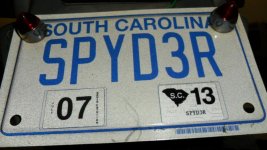Disc brake pads rub against the rotor continuously. The friction can make them vibrate or chatter, and squeal as a result. The noise should disappear when the brakes are applied.
Brake pads that become glazed or develop hard spots can squeal when applied. These conditions will also reduce your braking effectiveness.
Dirt or accumulated brake dust on the calipers, pins, rotors, or pads can cause brake squeal, as can humid or damp pads. These types can be either with brakes on, brakes off, or both.
Belts can cause squeal as they move against the sprocket flanges or the belt teeth. This depends somewhat on the design, the belt composition, and sometimes weather conditions.
Your squeal could be any of these, but start by seeing if it disappears when the brakes are on, and by cleaning the rotors and pads with brake parts cleaner. If the pads are glazed, hard application of the brakes from a speed of 45-50, several times in a row, can sometimes help. BRP has a service bulletin addressing the belt squeal.

